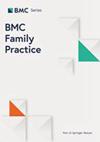Strategies that facilitate the delivery of exceptionally good patient care in general practice: a qualitative study with patients and primary care professionals
IF 3.2
3区 医学
Q1 MEDICINE, GENERAL & INTERNAL
引用次数: 0
Abstract
In recent years, proactive strengths-based approaches to improving quality of care have been advocated. The positive deviance approach seeks to identify and learn from those who perform exceptionally well. Central to this approach is the identification of the specific strategies, behaviours, tools and contextual strategies used by those positive deviants to perform exceptionally well. This study aimed to: identify and collate the specific strategies, behaviours, processes and tools used to support the delivery of exceptionally good care in general practice; and to abstract the identified strategies into an existing framework pertaining to excellence in general practice; the Identifying and Disseminating the Exceptional to Achieve Learning (IDEAL) framework. This study comprised a secondary analysis of data collected during semi-structured interviews with 33 purposively sampled patients, general practitioners, practice nurses, and practice managers. Discussions explored the key factors and strategies that support the delivery of exceptional care across five levels of the primary care system; the patient, provider, team, practice, and external environment. For analysis, a summative content analysis approach was undertaken whereby data were inductively analysed and summated to identify the key strategies used to achieve the delivery of exceptionally good general practice care, which were subsequently abstracted as a new level of the IDEAL framework. In total, 222 individual factors contributing to exceptional care delivery were collated and abstracted into the framework. These included specific behaviours (e.g., patients providing useful feedback and personal history to the provider), structures (e.g., using technology effectively to support care delivery (e.g., electronic referrals & prescriptions)), processes (e.g., being proactive in managing patient flow and investigating consistently delayed wait times), and contextual factors (e.g., valuing and respecting contributions of every team member). The addition of concrete and contextual strategies to the IDEAL framework has enhanced its practicality and usefulness for supporting improvement in general practices. Now, a multi-level systems approach is needed to embed these strategies and create an environment where excellence is supported. The refined framework should be developed into a learning tool to support teams in general practice to measure, reflect and improve care within their practice.促进全科医生为病人提供特别好的护理的策略:对病人和初级保健专业人员的定性研究
近年来,人们提倡采用积极的基于优势的方法来提高护理质量。积极偏差法旨在发现和学习那些表现优异的人。这种方法的核心是识别那些表现优异的积极偏差者所使用的具体策略、行为、工具和环境策略。本研究旨在:识别和整理用于支持全科医生提供卓越护理的具体策略、行为、流程和工具;并将识别出的策略抽象到现有的全科医生卓越性框架中,即识别和传播卓越性以实现学习(IDEAL)框架。本研究包括对有目的抽取的 33 名患者、全科医生、执业护士和执业经理进行的半结构式访谈中收集的数据进行二次分析。讨论探讨了支持在初级医疗系统的五个层面(患者、医疗服务提供者、团队、实践和外部环境)提供卓越医疗服务的关键因素和策略。在分析过程中,我们采用了总结性内容分析方法,对数据进行归纳分析和总结,以确定用于提供卓越全科医疗服务的关键策略,随后将其抽象为 IDEAL 框架的一个新层次。共整理出 222 个有助于提供卓越医疗服务的因素,并将其抽象到框架中。这些因素包括具体行为(例如,患者向医疗服务提供者提供有用的反馈和个人病史)、结构(例如,有效利用技术来支持护理服务(例如,电子转诊和处方))、流程(例如,积极主动地管理患者流量并调查持续延迟的等待时间)以及环境因素(例如,重视并尊重团队每位成员的贡献)。在 IDEAL 框架中增加了具体策略和情境策略,增强了该框架的实用性和有用性,从而为改进全科实践提供支持。现在,需要一种多层次的系统方法来嵌入这些战略,并创造一种支持卓越的环境。完善后的框架应发展成为一种学习工具,支持全科团队在实践中衡量、反思和改进护理工作。
本文章由计算机程序翻译,如有差异,请以英文原文为准。
求助全文
约1分钟内获得全文
求助全文
来源期刊

BMC Family Practice
医学-医学:内科
CiteScore
3.20
自引率
0.00%
发文量
0
审稿时长
4-8 weeks
期刊介绍:
BMC Family Practice is an open access, peer-reviewed journal that considers articles on all aspects of primary health care research. The journal has a special focus on clinical decision making and management, continuing professional education, service utilization, needs and demand, and the organization and delivery of primary care and care in the community.
 求助内容:
求助内容: 应助结果提醒方式:
应助结果提醒方式:


